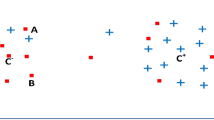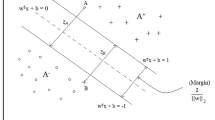Abstract
Given a dataset, where each point is labeled with one of M labels, we propose a technique for multi-category proximal support vector classification via generalized eigenvalues (MGEPSVMs). Unlike Support Vector Machines that classify points by assigning them to one of M disjoint half-spaces, here points are classified by assigning them to the closest of M non-parallel planes that are close to their respective classes. When the data contains samples belonging to several classes, classes often overlap, and classifiers that solve for several non-parallel planes may often be able to better resolve test samples. In multicategory classification tasks, a training point may have similarities with prototypes of more than one class. This information can be used in a fuzzy setting. We propose a fuzzy multi-category classifier that utilizes information about the membership of training samples, to improve the generalization ability of the classifier. The desired classifier is obtained by using one-from-rest (OFR) separation for each class, i.e. 1: M -1 classification. Experimental results demonstrate the efficacy of the proposed classifier over MGEPSVMs.
Similar content being viewed by others
References
Bector CR, Chandra S (2005) Fuzzy mathematical programmming and fuzzy matrix games. Springer, Berlin Heidelberg New York
Blake CL, Merz CJ UCI repository for machine learning . Department of Information and Computer Sciences, University of California, Irvine, CA. On-line at http://www.ics.uci.edu/mlearn/MLRepository.html
Burges C (1998) A tutorial on support vector machines for recognition. Data Mining Knowl Discov 2:121–167
Chen JH, Chen CS (2002) Fuzzy kernel perceptron. IEEE Trans Neural Netw 13:1364–1373
Dumitrescu D, Lazzzerini L, Jain LC (2000) Fuzzy sets and their application to clustering and training. CRC Press LLC, Florida
Fung G, Mangasarian OL (2001) Proximal support vector machine classifiers. In: Lee D et al (ed) Proceedings of the KDD-2001: knowledge discovery and data mining, San Francisco, CA. Association for Computing Machinery, New York, pp 77–86
Fung G, Mangasarian OL (2005) Multi-category proximal support vector machine classifiers. Mach Learn 59:77–97
Jayadeva, Khemchandani R, Chandra S (2004) Fast and robust learning through fuzzy linear proximal support vector machines. Neurocomputing 61:401–411
Keller JM, Hunt DJ (1985) Incorporating fuzzy membership functions into the perceptron algorithm. IEEE Trans Pattern Anal Mach Intell 7:693–699
Mangasarian OL, Wild EW (2006) Multisurface proximal support vector classification via generalized eigenvalues. IEEE Trans Pattern Anal Mach Intell 28(1):69–74
Parlett BN (1998) The symmetric eigen value problem. SIAM, Philadelphia, PA
Tikhonov AN, Arsenin VY (1977) Solution of ill posed problems. Wiley, New York
Author information
Authors and Affiliations
Corresponding author
Rights and permissions
About this article
Cite this article
Jayadeva, Khemchandani, R. & Chandra, S. Fuzzy multi-category proximal support vector classification via generalized eigenvalues. Soft Comput 11, 679–685 (2007). https://doi.org/10.1007/s00500-006-0130-2
Published:
Issue Date:
DOI: https://doi.org/10.1007/s00500-006-0130-2




